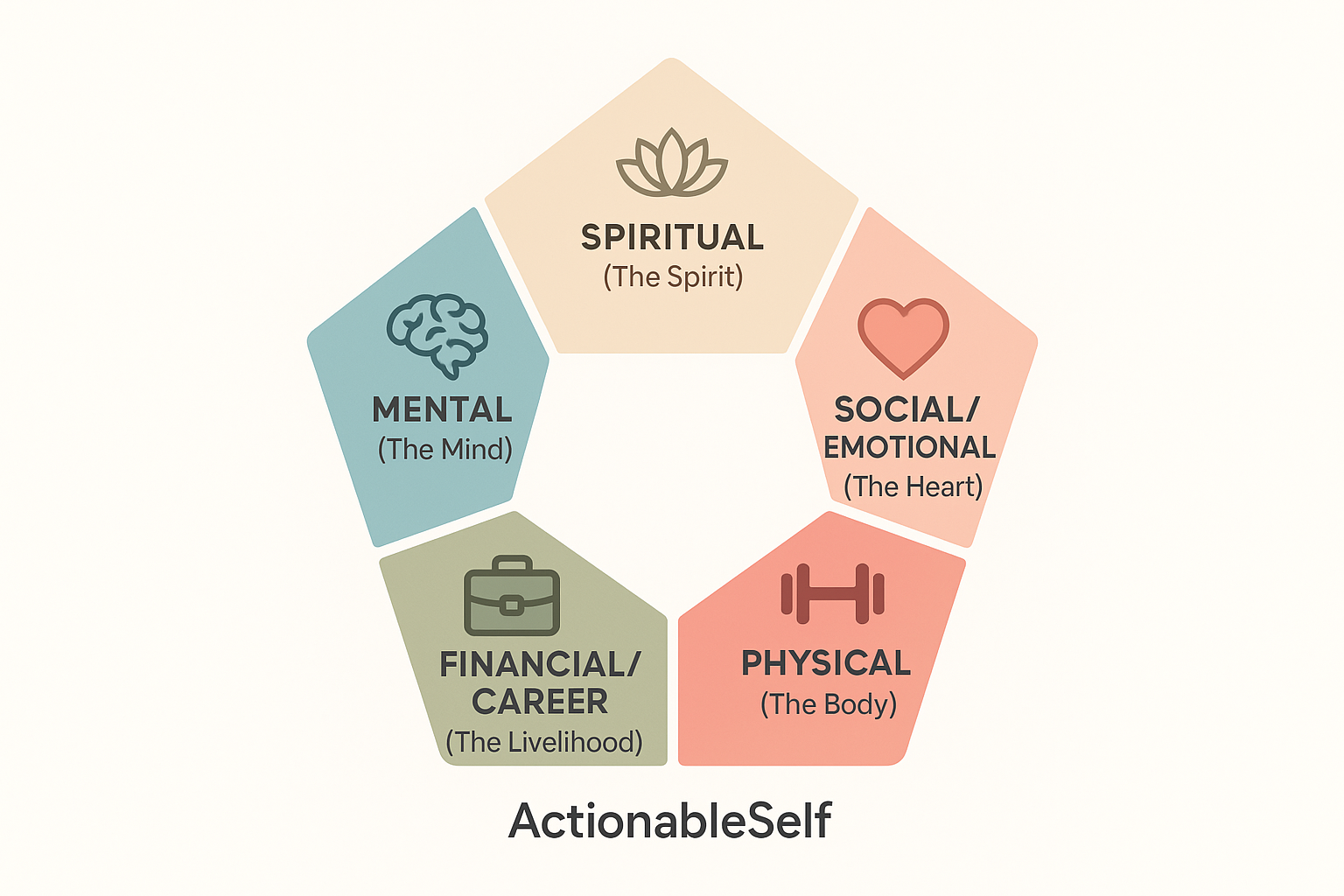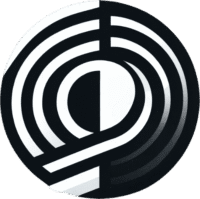The journey of personal development can feel like a vast, overwhelming concept. When you decide you want to grow, a daunting question immediately follows: “Where do I even begin?”
The secret to making it manageable is to stop thinking of it as one giant mountain to climb. Instead, picture your life as a dashboard with five key dials you can adjust. These are the core areas of personal development.
By breaking down your growth into these five essential domains, you can bring immense clarity and focus to your journey. You can’t work on everything at once, but you can choose to turn up one dial at a time, knowing that improving one area will create positive ripples across all the others.
This guide will provide a comprehensive overview of each of the five key areas of personal development. We’ll explore what each area includes, why it’s crucial for a fulfilling life, and provide actionable examples to help you identify where to start.

1. Mental Development (The Mind)

This area is the engine of your growth. It’s about intentionally expanding your knowledge, sharpening your intellect, and cultivating a flexible, resilient mindset. In a world of constant change, your ability to learn and think critically is your most valuable asset. This isn’t just about formal education; it’s about a lifelong commitment to curiosity.
- What it includes: Acquiring new skills, reading, critical thinking, problem-solving, creativity, challenging your own limiting beliefs, and developing a growth mindset.
- Why it’s crucial: A well-trained mind allows you to adapt to new challenges, make better decisions, and understand the world with greater depth. It’s the foundation upon which you build your career, solve complex problems, and even understand your own emotions.
- Actionable Examples:
- Read one non-fiction book per month on a topic outside your expertise.
- Take an online course on a high-demand skill (e.g., data analysis, digital marketing, coding).
- Dedicate 15 minutes each day to learning a new language with an app like Duolingo.
- Listen to educational podcasts or watch documentaries instead of purely entertainment-based content.
- Start a “commonplace book” or digital note-taking system (like Notion or Obsidian) to capture and connect ideas you learn.
- Practice solving puzzles, brain teasers, or playing strategy games to improve your problem-solving abilities.
- Engage in debates or discussions with people who hold different viewpoints to challenge your own thinking.
- Learn a new software relevant to your field.
- Follow thought leaders in your industry and read their articles or newsletters.
- Practice mindfulness to improve your focus and mental clarity.
2. Social & Emotional Development (The Heart)

This area focuses on your ability to understand and manage your inner world and to connect effectively with others. The quality of your life is often a direct reflection of the quality of your relationships and your emotional well-being. No amount of career success or intellectual knowledge can compensate for a life lacking in meaningful connection.
- What it includes: Developing emotional intelligence (EQ), improving communication skills, practicing empathy, building healthy relationships, managing your emotions, and setting boundaries.
- Why it’s crucial: Strong social and emotional skills are essential for everything from leading a team at work to navigating disagreements with a partner. They allow you to build trust, inspire others, and create a supportive network that is vital for resilience and happiness.
- Actionable Examples:
- Practice active listening in your next important conversation: listen to understand, not just to reply.
- Reach out to one friend or family member you haven’t spoken to in a while, just to check in.
- Start a daily journal to identify and name your emotional triggers.
- Learn to give and receive constructive feedback in a professional and personal context.
- Practice saying “no” to a request that would overextend your energy or compromise your values.
- Compliment a colleague on their work or a friend on a quality you admire.
- Try to see a recent conflict from the other person’s perspective.
- Apologize sincerely when you’ve made a mistake.
- Join a club or group based on a hobby to meet new people.
- Read a book on communication or emotional intelligence.
This area is so important, we’ve dedicated a complete guide to it. Explore our Guide to Effective Communication & Healthy Relationships.
3. Spiritual Development (The Spirit)

This is not necessarily about religion, though it can be for some. Spiritual development is about connecting with your core values, your sense of purpose, and what gives your life a sense of meaning beyond the day-to-day. It’s your “why.” It’s the anchor that keeps you steady in a turbulent world.
- What it includes: Mindfulness, meditation, spending time in nature, volunteering, journaling for self-reflection, identifying your core values, and aligning your actions with your deepest principles.
- Why it’s crucial: Without a connection to your purpose, even great achievements can feel hollow. Spiritual well-being provides a sense of peace, perspective, and inner direction. It helps you navigate life’s big decisions and find meaning even in difficult times.
- Actionable Examples:
- Meditate for 5-10 minutes each morning using an app like Headspace, Calm, or simply by focusing on your breath.
- Spend at least 30 minutes in nature once a week, leaving your phone behind.
- Write down your top 5 core values. For each value, write down one way you can live it more fully this week.
- Volunteer for a local cause you care about, even for just a few hours a month.
- Start a gratitude journal, writing down three things you’re grateful for each night before bed.
- Read philosophical or spiritual texts that resonate with you.
- Practice random acts of kindness without expecting anything in return.
- Create a personal mission statement that defines your purpose.
- Engage in a creative hobby that allows you to enter a state of “flow,” like painting, writing, or playing music.
- Practice forgiveness, both for others and for yourself.
To build your inner foundation, check out our Guide to Mindfulness, Resilience & Mental Well-being.
4. Physical Development (The Body)

Your body is the physical vehicle for your entire life’s journey. It’s the foundation of your energy, focus, and mood. Prioritizing your physical health is not a separate goal from your other ambitions; it’s the essential prerequisite that makes them possible.
- What it includes: Nutrition, physical exercise, quality sleep, and stress management.
- Why it’s crucial: When your physical health is optimized, your brain functions better, your mood is more stable, and you have the energy and resilience to pursue your goals. Neglecting your body will inevitably sabotage your efforts in all other areas.
- Actionable Examples:
- Go for a 30-minute brisk walk, at least three times a week.
- Replace one sugary drink with a glass of water each day.
- Aim for 7-8 hours of quality sleep per night by creating a relaxing bedtime routine.
- Cook one healthy, vegetable-rich meal at home this week instead of ordering takeout.
- Try a new physical activity you’ve always been curious about (e.g., yoga, rock climbing, dancing, martial arts).
- Incorporate 5 minutes of stretching into your morning routine.
- Get a health check-up if you haven’t had one in a while.
- Practice meal prepping on a Sunday to ensure you have healthy options during the week.
- Limit processed foods and focus on whole foods for one week.
- Stand up and walk around for a few minutes for every hour you sit at your desk.
5. Financial & Career Development (The Livelihood)

This area is about building a stable, fulfilling, and prosperous professional life. It’s about more than just making money; it’s about creating a career that aligns with your skills and values, and managing your resources in a way that creates freedom and security.
- What it includes: Advancing in your career, learning new professional skills, managing your personal finances, budgeting, saving, and investing.
- Why it’s crucial: Financial well-being is a major factor in reducing stress and creating the freedom to make life choices based on desire, not desperation. Career development provides a sense of contribution, mastery, and growth.
- Actionable Examples:
- Create a simple monthly budget to track your income and expenses.
- Identify one new skill that would make you more valuable in your career and find an online course for it.
- Update your resume and LinkedIn profile to reflect your latest accomplishments.
- Set up an automatic transfer to your savings account each payday, even if it’s just a small amount.
- Schedule a meeting with your manager to discuss your career goals and opportunities for growth.
- Read one book about personal finance or investing.
- Negotiate a bill, like your phone or internet plan, to practice your negotiation skills.
- Start a “side hustle” or freelance project related to one of your passions.
- Find a mentor in your field and ask them for a 30-minute virtual coffee chat.
- Listen to a podcast about business or finance during your commute.
Now that you understand the key areas, learn how to build a complete strategy in our Ultimate Guide to Personal Development.
Creating a Balanced Life
Looking at this list can feel overwhelming. Remember: you don’t need to be perfect in all five areas at once. The goal of this framework is not to create more pressure, but to provide clarity.
Think of it like a dashboard. You can’t turn all the dials to the maximum at the same time. The art of personal development is in intentionally choosing where to focus your energy for a season. Pick one or two areas that need the most attention right now, knowing that growth in one area will inevitably create positive momentum in all the others.
Which of these five areas are you most excited to focus on right now? Let us know in the comments!


